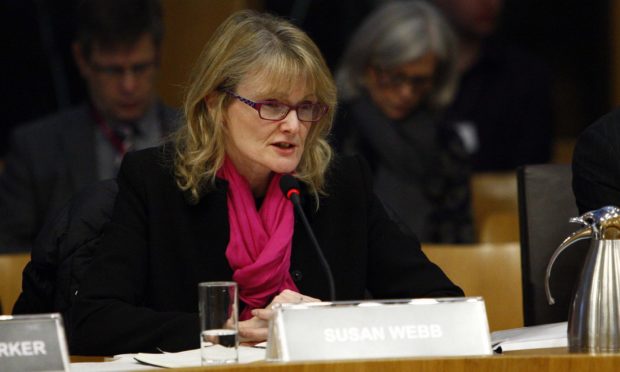The first vaccines for coronavirus should be administered in the north-east next week, health bosses have heard.
NHS Grampian’s director of public health Susan Webb has warned staff training requirements might mean the north-east’s inoculation programme might not start on Tuesday – but has told the health board it should begin within days.
Yesterday, First Minister Nicola Sturgeon announced the “beginning of the end” as she announced jabs would be available from December 8.
Workers from the Army, health boards and councils – who will give out the vaccines – will be first in line.
The treatment requires two doses between 21 and 28 days apart.
After those charged with delivering the vaccine, people with the greatest clinical need – including those over 80 and health and social care workers – will be prioritised.
Speaking at a meeting of the NHS Grampian board, Ms Webb said: “Our planning for the delivery of the vaccine has been underway for some months.
“We are ready to take delivery of the vaccine and as soon as we get delivery and the appropriate training and information materials we will commence the education of our staff.
“Once we are assured it is safe to start the programme, we will do so.
“We are anticipating a start date next week but I wouldn’t like to say hand on heart it will be December 8 because there are a number of factors we take into account before we commence.”
Yesterday, the first minister described the UK becoming the first country in the world to approve the Covid-19 vaccine from Pfizer and BioNTech, as the “best news” heard since the pandemic began nine months ago.
“Today is genuinely a good day. We’re not at the end of the pandemic yet… we cannot and must not ease up in our efforts to control it,” Ms Sturgeon said.
“But today does feel like it may well be the beginning of the end of this horrible experience.
“For that reason, I am sure I am far from the only one who feels a lightness of heart that I haven’t felt for some time.”
The jab has been shown in studies to be 95% effective and works in all age groups.
More than four million adults across Scotland will be offered the vaccine in the coming months.
The first minister has revealed she would be prepared to get the jab live on TV if it would do anything to persuade others to take up the offer of the vaccine.
She said there were no plans to impose sanctions on people who refused to be immunised “at this stage”.
Northern authorities have warned they will play their part in the effort to stem the spread of false information about the vaccine, pledging to monitor so-called ‘anti-vax’ comments on their social media posts.
Staff in the Highlands working to immunise the population will be hot on the heels of their north-east neighbours.
Dr Tim Allison, the health board’s public health director, said: “Over the last few months we have been working closely with the Scottish Government on the plans for the rollout of the Covid-19 vaccine.
“We are pleased that one vaccine has been given approval by the medicines regulator.
“We are aiming to begin the vaccination programme later this month, a major undertaking which will last several months.”
On Wednesday, the first minister described the UK becoming the first country in the world to approve the Pfizer and BioNTech vaccine as the “best news” heard since the pandemic began nine months ago.
Studies have shown the jab to be 95% effective, working in all age groups.
The multi-million-pound cost of coronavirus
Meanwhile, the cost of the pandemic on north-east health authorities has been laid bare: totalling nearly £34 million.
Papers considered by the NHS Grampian board highlighted the response to the virus had directly cost the authority £15.2 million between March and the end of October.
Health and social care partnerships in Aberdeen, Aberdeenshire and Moray – running everything from GP practices to care homes – spent another £18.7 million in those seven months.
The Scottish Government has issued funding worth £56 million to north-east health authorities to cost the actual and projected cost of the crisis and work to have non-coronavirus services safely up and running.
